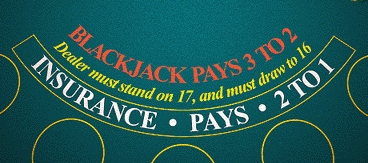Why it’s Never a Good Idea to Take Insurance in Blackjack

By Paul Kelly.
An insurance bet is an optional side bet that can be made in blackjack when the dealer shows an ace, allowing players to place wagers (up to half of their original bet) on whether the dealer has a blackjack. If the player guesses correctly, he will be paid double the insurance bet and lose his original blackjack bet. Thus, you essentially break even if your insurance bet wins.
Insurance is only offered when the dealer has an ace-up and you can only take insurance for up to half of your main bet. It is possible to keep track of all the 10s in a deck of cards, allowing the player to make perfect insurance decisions. However, as you add more decks this becomes more difficult. Insurance is the most important play variation that is possible for card counters.
Insurance bets are generally considered a poor choice because the dealer’s odds of getting blackjack after an initial ace are about 30%.1)In a randomly shuffled 52-card deck the probability of the dealer having a 10 as his hole-card is 16/51 (31.37%). Therefore, the insurance bet odds would have to be at least 3:1 for it to be worth it. The discrepancy is quite large, making insurance bets reasonably low value. For example, the house edge on insurance ranges from 5.88% (single deck) to 7.47% (8 decks). Although the house edge is high, card counters can easily exploit this.
Although many versions of blackjack offer insurance options, players should be wary of the drawbacks that come with it. Some versions are highly played and you can play various versions of blackjack at the list of options at Luckynj.com. Rest assured that the games available here will only provide the top experiences possible.
The following example demonstrates why betting blackjack insurance is a losing strategy in the long run.
- You are playing without a partner in a one-deck game and neither card in your initial hand has a value of 10.
- Thus, your £10 insurance bet has the best chance of winning as 16 of the remaining 49 cards have a value of 10.
- Despite this, your stance is unlikely to be viable in the long run.
- The £10 insurance bet loses 33 times and wins 16 times on average. Each victory yields a £20 profit, for a total of £320.
- However, after 33 defeats at the cost of £10 each, you end up losing £10 altogether.
Conclusion: Avoid The Insurance Side Bet
Blackjack players who are not card counters should never place insurance bets, even if they have been encouraged by more experienced players. One other scenario we haven’t mentioned is when the player receives a blackjack hand and the dealer has an Ace up. In this case, the dealer will ask you if you want “even money”, which is the same as asking you if you want to insure your blackjack hand. Just remember, you are better off winning 3 to 2 most of the time than winning even money for sure.
But what if you are playing in a blackjack game that only pays 6 to 5 on a blackjack.2)Using the word “never” is not always applicable for advantage players. In the case of games that pay 6 to 5 at blackjack: There is a small player advantage of about 0.1% if the casino offers even money in these games. However, most casinos don’t offer even money in 6 to 5 games for this very reason. The surge in this rule has caused much confusion about whether it’s better to take even money or insurance on your blackjack. Because the arithmetic is different from a 3 to 2 table, casinos don’t provide this shortcut, but you may still be able to purchase insurance on your blackjack. The issue about completely doing away with insurance has maybe re-ignited as the 6 to 5 blackjack’s only benefit. Not all casinos, however, will allow insurance in a 6 to 5 game.
Finally, for basic strategy players, betting on blackjack insurance is a losing strategy in the long run, even under the best circumstances.





